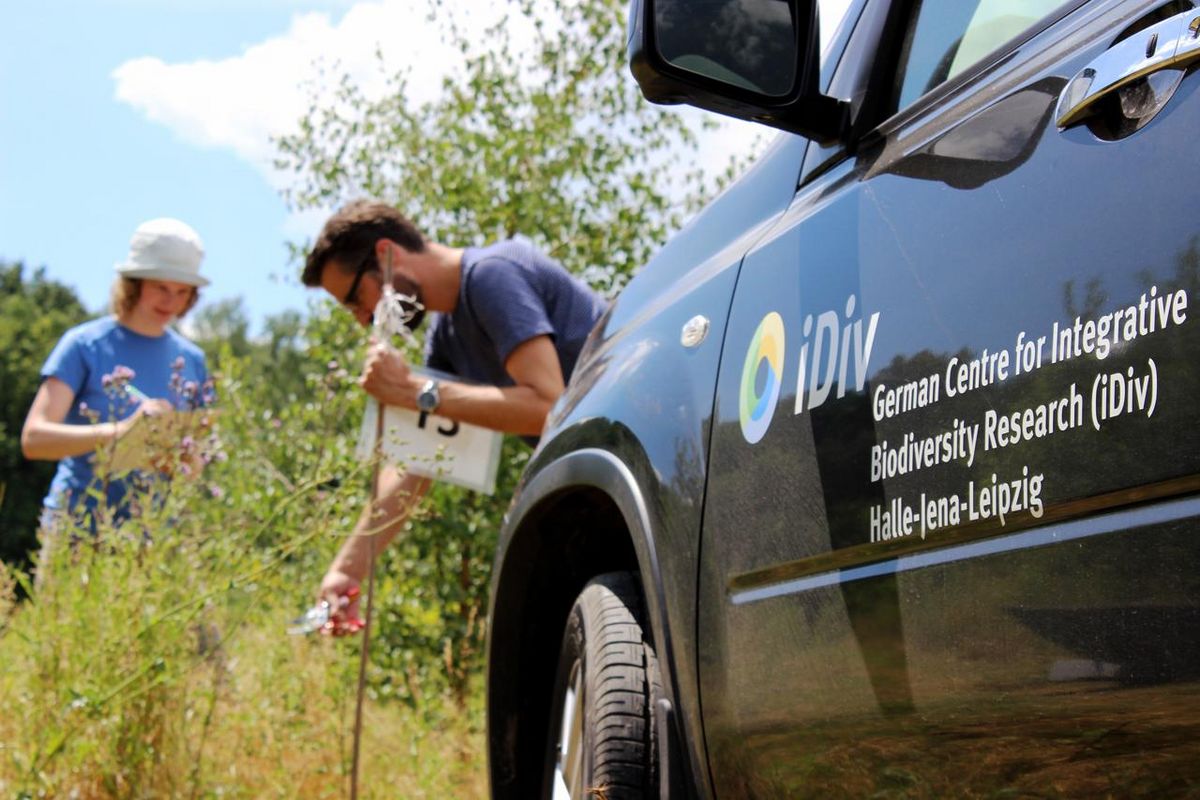This research cluster investigates how biodiversity develops, and how its dynamics and expansion affect ecosystems. This includes quantitative and qualitative analysis of recent and historical conditions and their respective evolutionary biology. Diversity and ecological interaction is investigated at all levels: from cells to species, to populations, to interactions, to taxonomy.
Research environment
Both the iDiv and the Cluster Biodiversity, Ecology and Evolution are embedded into the University's Research Profile Area „Sustainable Sytems and Biodiversity“. The Cluster is the Faculty's and Leizpig's contribution to iDiv and brings together 14 research groups. They originate from the Institute of Biology, the Helmholz Centre for Environmental Research, the Max Planck Institute for Evolutionary Anthropology Leipzig and the Max Planck Institute for Biogeochemistry Jena, as well as from the Senckenberg Museum of Natural History Görlitz. The Cluster maintains close cooperation with the Intitute of Geography (Faculty of Physics and Earth Sciences) and the Leibniz Institute of Plant Biochemistry in the city of Halle (Saale). The Cluster also runs the Botanical Garden and last but not least the iDiv Ecotron in Bad Lauchstädt.
Focus Topics
Recent distribution patterns of organisms stem from extended time periods of evolutionary and demographic processes. Phylogenetic and phylogeographic methods assist us in the reconstruction of the origin and stability of species and their distribution. Findings will then be correlated with environmental conditions.
Other projects focus on unknown venoms and toxins, namely on their molecular evolution, diversification as well as their function and application.
Another set of research projects will provide answers about hybridisation and polulation genetics in the context of changes and fragmentation of habitat and about the process of speciation.
The research group of the Jena Experiment (FOR 5000) investigates the influence of plant diversity on the expression of plant characteristics and the microevolutionary adaptation as well as the resulting feedback effects on biotic biotic interactions and ecosystem functions.
The biological diversity of our planet in all its facets - be it taxonomical, genetical, phylogenetical, functional or structural - is still not fully known. Distribution patterns and scale dependences are far from being understood.
We strive to draft an analysis of the phylo-geographical distribution of species and diversification processes. By combining phylogenetics with bio-geography we try to address the global phenomenon of uneven distribution between taxonomical, phylogenetical and functional diversity and hope to find out how distribution is impacted by anthropogenic environmental chances.
Our analysis of diversity will be carried out in eco systems that have been little studied so far, e.g. in the ground and in the canopy („hidden diversity“). Physiodiversity emphasizes molecular and mechanistical understanding, i.e. how biodiversity is controlled by physiological activities of organisms such as photosynthesis.
For the global recording of soil biodiversity a global monitoring network has been established under the leadership of iDiv (SoilBON).
More and more, our growing world population will have to deal with conflicts of interest. These will result from a growing demand of ressources on the one hand, and the concern to preserve biodiversity on the other. Our focus topic thus compares demographic observations with how climate change impacts reproduction, distribution and behavioural diversity of species. We will design concepts for long-term observations, that gather information on the impact of renaturation on biodiversity and ecosystem services.
We also aim at developing a monitoring system for the evaluation of a number of protective measures or early alert systems for the diversity of species, the interaction of species, the abundance of species, and the detection of so-called „tipping points“ or „regime shifts“.
In addition, the cluster will provide appropriate mediation strategies by focusing on the role of qualitative teaching/learning as a prerequisite for an impactful conservation of ecosystems.
Biodiversity comprises the variety of species, genes, interactions and communities and has an enourmous impact on the functioning of ecosystems.
This Focus Topic investigates how biological diversity is, on the one hand, heavily influenced by global change (climate change, land use change, spread of invasive species), but how on the other hand biological diversity provides ecosystems with a certain resistance against the influences of global change.
Functional biodiversity research investigates the features or arrays of features of biocoenoses and their impact on ecosystems along natural or experimental diversity gradients. Guided interaction of defined communities will allow us to develop novel, climate-friendly and efficient biotechnological systems and robust processes.
Research outlook
Scientists of the C-BEE take the lead in a number of large research networks (e.g. DFG FZT 118, DFG FOR 5000) and are involved with research in numerous other networks (e.g. DFG SPP1374, DFG FOR 1261, BMBF VIP 03V0001, DFG SPP 1158/11, DFG FOR 891, DFG FOR 918, SFB 1076). Future collaborative projects (SFB Transregio, research groups, EU projects) are in the making. These will benefit from and expand recently developed cross-institution infrastructures. These structures have been created within the framework of the iDiv (e.g. large-scale, experimental platforms such as the Ecotron and the MyDiv Experiment and the global soil monitoring network Soil BON). They will consolidate future research initiatives and thus enhance synergies of different areas of expertise. Furthermore, intensified cooperation with the Faculty of Economics and Management Science has lead to a preparing joint interdisciplinary DFG Research Training Group. A DFG Collaborative Research Centre on "Biodiversity and Extreme Climate Events" is in preparation, with the significant contribution of numerous members of the C-BEE faculty cluster.
